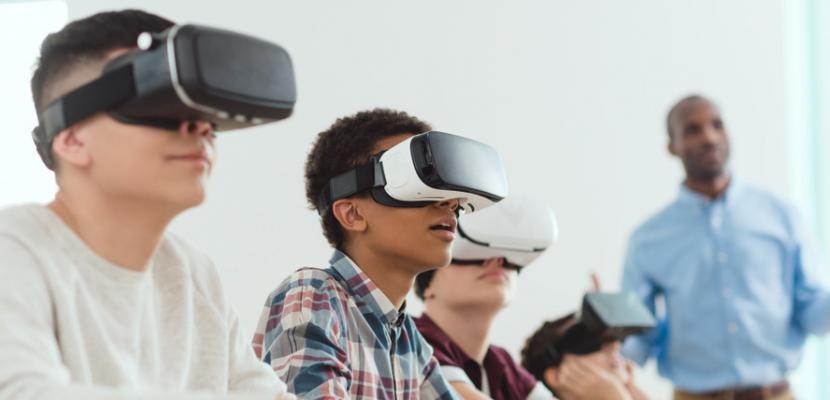
A new study uses VR to create virtual classrooms, then test students' performance in three scenarios with different noise settings. PICTURE: Shutterstock
Virtual reality can be used to test the acoustics of classrooms that are still on the drawing board, helping students to learn without distractions.
A new study by a team at Bond University used VR headsets to create virtual classrooms, then compared students’ cognitive performance in three scenarios: no ambient noise, typical classroom ambient noise, and ambient noise with acoustic treatments.
Ambient noise had a negative effect on cognitive performance but was neutralised by acoustic treatments, putting it on a par with the no-noise simulation. Acoustic treatments commonly include wall and ceiling panels that absorb noise.
Libby Sander, an Assistant Professor of Organisational Behaviour at the Bond Business School, said poor classroom acoustics caused students to miss up to one in four spoken words.
“You can imagine the impact that has on their learning, their recall and on their education,” Dr Sander said.
“Another study in Europe showed noise levels in classrooms were having significant negative effects on teachers' health, almost at the threshold level of a heart attack.
“It's an area that's incredibly important for both teachers and students.”
Fellow study author Matthew Ottley of acoustic consultancy Marshall Day Acoustics said the research was significant because replicating the tests without VR was costly and time-consuming.
“If you did this experiment in real life you might end up with a month between the first round of tests and the second, whereas we can do it instantly (with VR) and control all the variables,” he said.
“Acoustic treatments can often be cut during the design stage of schools and classrooms because it's maybe not evident to people making the decisions the importance of those things.
“The more data we have to demonstrate the real benefit to students of providing acoustic treatments, the more likely it is that those treatments will get through to the end product.”
Mr Ottley said the acoustics of classrooms was becoming more important because of changes in the way students were taught.
“The way classroom design is going, there are a lot more innovative learning environments -- you might have 80 kids in a large single space with multiple groups doing different activities at once.”
James Birt, a Professor of Computer Games at Bond University, said the study confirmed VR was a low-risk way to test learners in complex scenarios that were difficult to reproduce in the real world.
“By combining cutting edge visuals and spatial audio, multiple scenarios can be user-tested, reducing time and costs associated with real-world testing and optimising the design process.”
Oliver Baumann, an Assistant Professor of Psychology at Bond University, said the research differed from previous studies because it used objective measures of performance such as heart rate rather than relying on participants to describe how they felt.
“Self-reports can be biased because students might not want to admit they are negatively affected by noise, or sometimes might not even be fully aware of it,” Dr Baumann said.
“On the other hand, changes in heart rate or response speed on a standardised cognitive performance test provide unbiased and reliable insights into the effects of classroom noise.”
The study has been published in Frontiers in Virtual Reality.
The study can be found here: https://doi.org/10.3389/frvir.2021.620503

